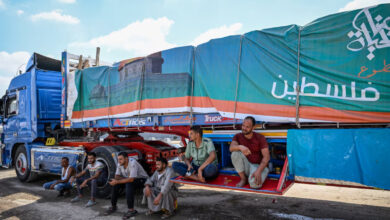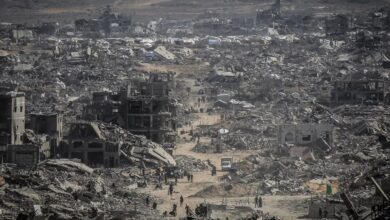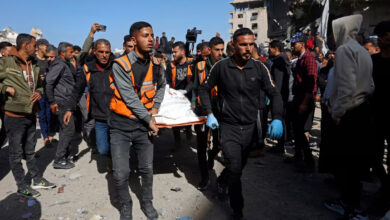As the world gets ready to party this New Year, more than 1000 people from 40 countries are planning a protest march in the Gaza Strip one year after Israel’s "Operation Cast Lead" that killed more than 1300 Palestinians.
"Nothing’s been done to help the people of Gaza," said Anne Wright, a retired US Army colonel and peace activist. "There’s no reconstruction because construction equipment and companies were targeted by the Israeli military," she added.
Convoys of humanitarian aid will arrive in Egypt in coming weeks in hopes of traversing Egypt’s Rafah border crossing for the planned Gaza Freedom March. Groups say they are still in negotiations with the Egyptian government to receive permission to travel into the besieged enclave. However, they declined to provide details, for fear of jeopardizing their prospects.
"We’ll be very diligent to provide [the Egyptian government] with the names of the people in the delegation," Wright told Al-Masry Al-Youm.
Ever since Israel’s assault on the Gaza Strip ended in January of this year, a number of human rights groups have delivered aid to Palestinians despite the joint Egyptian-Israeli blockade imposed on the devastated territory. This event is expected to include a large number of protesters and aid, therefore the groups have spent months planning for it.
"We have requested that the relevant Egyptian authorities let all vehicles and aid pass through the Rafah crossing," said Kevin Ovenden of Viva Palestina. "We contacted them and explained the humanitarian nature of our trip."
The Egyptian government’s criteria for granting entry into the strip remain unclear. Initially, the government requested a notarized document from foreign embassies stating that their citizens were aware of the potential risks. Peace activists say they are no longer requiring their delegations to request this document, but individuals still must provide details — such as names and passport data — in advance.
When contacted by Al-Masry Al-Youm, the Egyptian Foreign Ministry directed inquiries to the State Information Service (SIS), which stated that it was only responsible for travel by foreign journalists. The foreign affairs press office then provided the number of the ministry’s Department of Palestinian Affairs, which failed to answer repeated phone calls. The US Department of State, for its part, declined to comment on trips to the Palestinian territories by private citizens.
For the most part, previous trips by non-Arab foreigners to the Gaza Strip have been successful. A convoy of vehicles sent by Viva Palestina was held up in Alexandria in July, but 200 people still managed to cross into the strip with US$250,000 worth of medical aid and other supplies. The group is prepared for the possibility that some participants will be denied entry on 27 December, when they plan to arrive on the one-year anniversary of the launch of the Israeli assault.
According to the group’s website, "A key aspect of this humanitarian mission is to break the illegal siege imposed by Israel and get what is needed into Gaza … Everyone who intends to take part must prepare themselves for difficulties, delays and disappointments along the way."
Wright, who is planning the Gaza Freedom March in cooperation with the women’s rights group Code Pink, recently arrived in Cairo to help make preparations. Wright served as a US diplomat for 16 years, but retired after the US-led invasion of Iraq in 2003.
She was an active protester of the Bush administration, and proudly claims to be one of the first people to protest the policies of the current Obama administration. At the time of Cast Lead, Obama was vacationing in Hawaii following his electoral victory. Wright was dismayed by the president-elect’s refusal to comment on the Gaza assault, so — along with several others — she participated in a protest outside his compound.
After Israel ended the assault in January — when Obama was inaugurated — Wright flew to Cairo and then crossed into the Gaza Strip within 48 hours. She made it in with two other people out of a total of 1000 people who waited at the border.
Since then, she has visited the hapless territory more than once. Tighe Barry, also with Code Pink, has similarly traveled to the strip to deliver aid. On one visit, he delivered baskets of women’s products such as creams and soaps. He recalled how Palestinians danced for him in a show of their appreciation.
"These people — who are subject to extreme suffering — honored me that day, when all I did was bring them gift baskets," he said.
"In my world, if someone bombed my whole family, I would be angry," Barry added. "Yet they show an immense capacity for love, forgiveness and resilience. I honor them for that."




